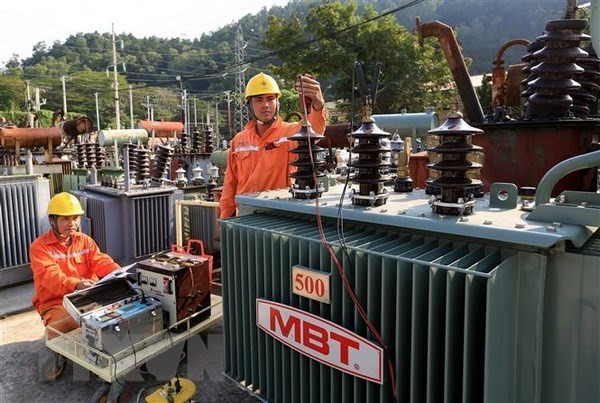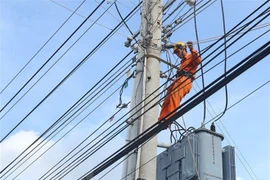Hanoi (VNA) - Vietnam is struggling with several projects so the electricty sector needs to focus on developing power supply sources, according to Deputy Prime Minister Trinh Dinh Dung.
The Vietnam Electricity (EVN) said in 2019, power production and purchase are forecast to reach 232.5 billion kWh, up 9.2 percent from 2018, but the EVN is ready to meet higher demand.
The revelation was made by an EVN official during a conference held in Hanoi on January 31 to launch its tasks in 2019.
Power supply reliability better than 2017
A report by the EVN said the total power production and purchase hit 212.9 billion kWh in 2018, 2.4 billion kWh higher than the target and up 10.36 percent from 2017. Notably, power production at Hoa Binh hydropower plant reached a record high of 12.3 billion kWh, surpassing the designed capacity by 51.2 percent.
Commercial electricity reached 192.93 billion kWh, up 10.47 percent against 2017. Power transmission hit 184.2 billion kWh, a 10.88 percent rise from 2017. Of which, 20.8 billion kWh was transmitted from the northern and central regions to the southern region, equivalent to 20 percent of its demand.
The EVN also said in July, it brought electricity to the remaining two communes. As of late 2018, all communes nationwide were given access to electricity, with 99.37 percent of households across the country connected to the national grid and 99.05 percent of rural families have been provided with power.
EVN Deputy General Director Nguyen Tai Anh said the System Average Interruption Duration Index (SAIDI) averaged 732 minutes, down 30 percent from 2017.
Meanwhile, a survey by the Vietnam Chamber of Commerce and Industry (VCCI) showed that the rate of enterprises satisfied with power supply services reached 74 percent, up 5 percent annually.
EVN’s consumer satisfaction level hit 8.11 points, up 0.14 point from 2017. EVN’s Ho Chi Minh City branch scored the highest with 8.33 points, or a 0.07 point rise, said an EVN leader.
Additionally, its power loss was estimated at 6.9 percent in 2018, one year earlier than the five-year schedule assigned by Prime Minister Nguyen Xuan Phuc.
Ready for contingencies
According to the EVN, the power demand is forecast to keep rising while the power reserve is unavailable. Therefore, apart from the EVN, other power plants must also work to ensure sufficient supply for the whole country.
The biggest concern is the fact that by late 2018, many hydropower reservoirs, especially in the central region, failed to store enough water, resulting in hydropower output falling short of 2.56 billion kWh. The EVN also plans to mobilise from 2.4 billion to 7 billion kWh of oil-fueled power this year.
Despite difficulties, the EVN vowed to safely and stably operate the national power grid and ensure sufficient power supply for socio-economic development and people’s lives.
Anh said the EVN put into operation five turbines with a combined capacity of 1,560 MW this year, including the expanded Duyen Hai III, Vinh Tan IV, and Da Nhim (second stage) power plants and the Thuong Kon Tum hydropower plant; as well as the newly-launched Quang Trach I thermal power plant , and the Phuoc Thai 1 and Se San 4 solar power plants, which will work towards ensuring supply for the south.
EVN leaders asked power companies to devise plans to provide electricity each month. They were requested to work with local authorities and firms to stay ready for contingencies; minimise power outages; and repair, maintain, and build further power works.
EVN’s major targets in 2019
Speaking at the event, Deputy Prime Minister Trinh Dinh Dung spoke highly of the EVN’s efforts to ensure sufficient power supply for socio-economic development and people’s lives.
He also pointed out challenges faced by the sector, including the risk of power shortage in the context that power for production and lives must be ensured.
The Deputy PM said the sector’s power output nears 48,000 MW at current, which will hike to roughly 90,000 MW by 2025 and 130,000 MW by 2030, or possibly even higher when hydropower source has been effectively tapped.
Challenges are also seen in coal-fired power supply as many projects are delayed, affecting electricity supply, and the country’s public debt ceiling.
In order to meet the rising demand for power that will increase by around 10 percent in 2019, the Deputy PM asked the EVN to work with ministries and agencies to define power structures and priorities over periods, as well as priority projects.
The sector needs to make breakthroughs, particularly targeting how to develop power supply for production and local lives in 2019.-VNA






























